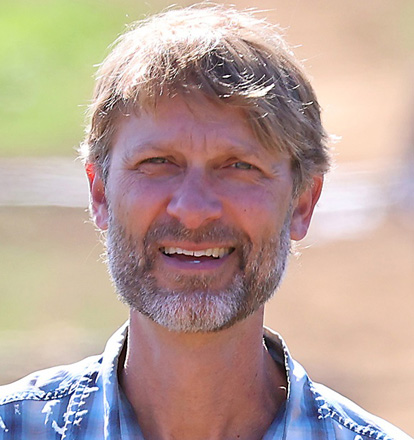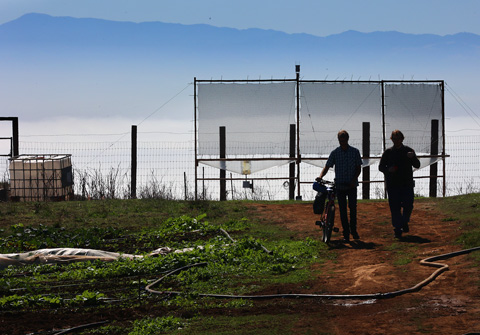Tell us a bit about yourself, your background, and how your path led to where you are today.
My parents were hippies and we moved to a very rural part of Northern California, near Mount Shasta in 1972. I went to a small, one room schoolhouse with only anywhere between 10 and 20 students. Both of my parents were  teachers at this school, and I attended through eighth grade. It was a type of free school and it was very connected to nature, just the way my parents are.
teachers at this school, and I attended through eighth grade. It was a type of free school and it was very connected to nature, just the way my parents are.
We would go out and do observations of the natural world a lot, so that kind of set the tone for me.
I was also far advanced in math and started playing music at a young age as my whole family is very musical. These things were passed down to and always around me.
I went to college at Southern Oregon State in Ashland, Oregon and then transferred to UC Santa Cruz in 1986. It was at UCSC that I really fell in love with chemistry and took classes from some of the same professors that are still working here. At that time, I was living with people who were environmentalists which influenced me to shift my focus from physical chemistry to something more applied to the environment.
I went to graduate school at the University of Washington in Seattle, in 1990, to pursue an environmental chemistry program, and I got a PhD in chemistry in 1995. I was lined up to do a Postdoc, continue doing research and become a professor, but that line of work wasn't speaking to me, so I ended up teaching at community colleges for six or seven years in the Seattle area.
At the same time, I was in a rock band in Seattle playing quite a bit. Music was a big part of my life, even though I knew I was never going to make a living playing music. But it was definitely fun.
I got back into research around 2001 at the University of Washington to do a postdoc researching mercury as a toxin in the environment. I have been a mercury researcher for 23 years now and have a number of high-profile publications about the topic. I discovered the presence of methylmercury in fog water almost by accident, as no one had ever [taken] these measurements before.
I ended up publishing a paper in 2012 that generated a lot of media attention on Newsweek, New York Times, Scientific American, National Geographic and many others.
I got married (my wife is a Rabbi) and had kids. We moved back to Santa Cruz, she got a job at a temple as a and I was a stay home dad, when I launched the singing scientist career.
I continued doing consulting work in mercury and atmospheric science, and started working in a lab at UCSC with Professor Flegal.
Through my grant writing efforts, I was able to get some projects funded and became a project scientist at UC Santa Cruz. In 2011, I started lecturing in chemistry.
I have three funded projects and we are still writing proposals to figure out how and where to harvest fog water as a viable water source.
I have taught basically every quarter since 2011 and brought in over a million dollars in research funds for my work over the past decade. Although I have no job security, every year I get asked to teach classes for a couple of different departments.
As a researcher and Chemistry Lecturer, tell us about the most challenging and the most rewarding part of your work?
I'd say the research is the most rewarding. Working at the microscopic scale, trying to understand chemical processes and the environment. Those are so important for making decisions and understanding how pollutants move in the environment across different compartments. It is exciting to uncover new knowledge. As for teaching, I think where I've made the most impact is in the capstone courses where the students are eager, and come into it with a real desire to learn. They are passionate about wanting to improve society, improve the way the world works and they can use their intellect to do that. It is great to be a part of that enthusiasm that 20-something-year-olds have.
The most challenging is making a class that's coherent and everything fits together, giving assignments that are meaningful and making sure that the students get constructive feedback that's actually helpful to keep them engaged with the material.
I understand you are responsible for The Large Fog Collector Project, by the Peter Weiss-Penzias Lab. Can you tell us the story behind that and what do you see in the future of this project, ideally?
The Fog Collector Project is great. I've been working with colleagues collecting fog water to understand how it is connected to coastal meteorology. Questions we ask: where are the best places to collect fog? How much could we really collect? Could you use it as a supplemental water source?
connected to coastal meteorology. Questions we ask: where are the best places to collect fog? How much could we really collect? Could you use it as a supplemental water source?
The severe drought of 2020 and 2021 made it clear to me that it was time to push this forward.
We got funded for the Fog Harvesting System through the Carbon Fund. I really owe a lot to the Carbon Fund for really pushing this work forward that hopefully is going to lead to something substantial. We were able to set up a Fog Harvesting System at the UCSC Farm, with the work of several undergraduate students who helped design and build the collectors. A vegetable garden is watered using the water from the fog collector. We are tracking water collections via sensors and correlating it with meteorological variables. We sent an undergraduate student to attend an international conference on Fog last summer, with a poster from the project, so there's really been a lot of good things that have come out of this.
We put on a community event at the farm called FogFest last October which was pretty successful.
I am feeling it is imperative to really put some more research into Fog Harvesting and see what it could produce for us. It is very exciting.
What does sustainability mean to you?
Well, I've spent a lot of time thinking about it.
I am very passionate about people using community gardens as a way to connect to more of the natural cycle, the natural limits of the world, and as a way to build sustainability. So it's not really about recycling or taking the bus, it's more of a mindset.
Sustainability is a goal. It's a target. It's an ideal practically speaking, we're probably not going to reach it. That is why it can be a little bit disheartening to use the term.
Everyone is wasteful or selfish, just living in this modern society. In other words, we're creating more waste and more byproducts than the earth can sustainably absorb. So carbon dioxide is a perfect example. Like there's just net CO2 being released all the time. Until we can figure out how to leave no wake, we haven't truly reached sustainability. We need to keep our eyes on the target, as a goal. It is so important to keep reminding ourselves.
We have to still be idealistic and keep focusing on our principles, our values and keep refining our models in order to find solutions that work.
And it's on a local scale. Certainly doing things from the top down, having big laws and changing things is going to really make a much bigger difference than what happens on the local scale. But in order for something to be truly sustainable, it has to be individual by individual.
Is there anything else about the work you do that you would like to share? I learned you are also called the “Singing Scientist” and have performed with your band “Peter Weiss and the Earth Rangers”.
Yes, music is still a big part of my life. We didn't really do any shows for a couple of years due to COVID, but last summer we played three events and it looks like we'll be playing at a church for Earth Day.
I also sing on the last day of my classes. I'll bring my guitar in and sing for my students. And most of them already have knowledge that I have these albums out there.
Lastly, what do you do for fun outside of work?
There are various musical things that I do. I'm active in the Jewish temple and I try to get exercise.
For several years now, I play basketball with a bunch of folks older than me. It is quite fun, a great workout, and a men's support group too where everybody can go and lose their temper and nobody cares. You just leave it all on the court.
I love to get out and hike when I can, and surf. Although it has been a little while. I like being active and like gardening a lot.
